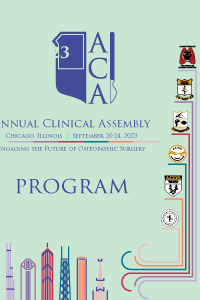General Surgery
Retrospective Analysis on Hyperlipidemia and COVID-19 Outcomes Investigated in a Rural Midwestern Population
Location: Grandball Room 1-2
- LS
Laura M. Schreck, DO Student
Kansas City University
Joplin, Missouri, United States
Primary Presenter(s)
Introduction/Purpose: COVID-19 is a respiratory disease caused by SARS-CoV-2, a coronavirus discovered in 2019. Its impact on the world continues to be studied due to the significant death toll of the disease. As the COVID-19 pandemic remains ongoing, examining COVID-19’s association with comorbidities and resulting mortality is necessary. This study focuses on population health outcomes with COVID-19 infection and hyperlipidemia (total cholesterol greater than or equal to 200 mg/dL) as a comorbidity, including potential associations with age and sex.
Methods or Case Description: As a retrospective observational study, patients were divided into three populations based on COVID-19 and/or hyperlipidemia dependent on International Classification of Disease (ICD10) codes reported in the electronic medical record system at Freeman Health System in Southwest Missouri from April 1, 2020 through December 31, 2021. Wald’s methods and two sample proportion summary hypotheses with confidence intervals were used for comparison. The populations were subdivided and analyzed for age and sex differences.
Outcomes: Patients with both COVID-19 and hyperlipidemia had a higher mortality rate than patients with COVID-19 and without hyperlipidemia, and patients with hyperlipidemia and without COVID-19; patients with COVID-19 and without hyperlipidemia had a higher mortality rate than patients with hyperlipidemia and without COVID-19. All comparisons across these populations were statistically significant (p-value < 0.05). While increased age was associated with increased mortality in all groups, sex was not predictive in this regard.
Conclusion: Our study provides insights into variables affecting COVID-19 outcomes in a rural Midwestern population by showing the comorbidity of hyperlipidemia contributes to increased mortality.
Methods or Case Description: As a retrospective observational study, patients were divided into three populations based on COVID-19 and/or hyperlipidemia dependent on International Classification of Disease (ICD10) codes reported in the electronic medical record system at Freeman Health System in Southwest Missouri from April 1, 2020 through December 31, 2021. Wald’s methods and two sample proportion summary hypotheses with confidence intervals were used for comparison. The populations were subdivided and analyzed for age and sex differences.
Outcomes: Patients with both COVID-19 and hyperlipidemia had a higher mortality rate than patients with COVID-19 and without hyperlipidemia, and patients with hyperlipidemia and without COVID-19; patients with COVID-19 and without hyperlipidemia had a higher mortality rate than patients with hyperlipidemia and without COVID-19. All comparisons across these populations were statistically significant (p-value < 0.05). While increased age was associated with increased mortality in all groups, sex was not predictive in this regard.
Conclusion: Our study provides insights into variables affecting COVID-19 outcomes in a rural Midwestern population by showing the comorbidity of hyperlipidemia contributes to increased mortality.

